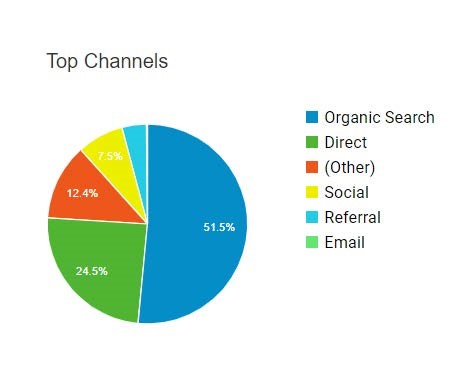SEO Guides, Tips & More!
Learn from Our Experience
Why Is SEO Important in 2020?
After the coronavirus pandemic hit the U.S. in March 2020, accounting firms immediately reevaluated their marketing budgets. When marketing dollars were redirected from sponsorships and conferences, many marketers turned to where they could make their budget go further: digital. Now, as firms begin to assess the impact of their switch to digital advertising, one area that should not be neglected is SEO.
Why is SEO important in 2020? Take a look at the Google Analytics data for Audience Acquisition. Most of the time, organic search accounts for at least half of all traffic to most websites. This is true in accounting just as with any other industry. Balancing SEO with other digital marketing tools is vital to get the right kind of audience on the page for longer periods of time.
These are just five of the ways that SEO can help accounting firms be seen and remain top of mind.
Organic Search Quality Increases With SEO

Most traffic to websites comes from organic search, yet businesses are still prioritizing spending on paid search. When someone types in a keyword or phrase, it’s an SEO strategy that gets the website on the first page of results, or better yet, the featured snippet. When on- and off-page SEO aren’t in sync and aren’t being prioritized, it is unrealistic to expect that the website will land in first-page search results.
Accounting firms should be striving to get on page one of Google SERP for at least their major service lines or industry niches. Top Google search results get the most click-throughs; lower-ranked sites may only get a fraction of click-throughs from organic search if any. SEO strategy helps connect the dots between keywords, content, audience targeting, and Google requirements so that organic search traffic is improved.
And when organic search traffic is improved with the right audience, it’s much more likely that digital word of mouth increases, too. Relevant, useful content paired with the right target audience is a great combination.
Related reading: How to Get Featured Snippets
Page Structure Improves With SEO
One of the aspects of SEO that is not talked about much is the attention that professional SEO consultants pay to page structure. Almost any marketer with a baseline level of knowledge about keywords and their website’s content management system can add on-page keywords and back-end metatags. A well-rounded SEO strategy will also consider the role that page structure and site mechanics play in obtaining organic traffic.
A website with a streamlined structure will perform better in organic search and SEO. One reason is that Google’s algorithms prioritize clean, organized site structures. Another reason is that a better structure usually equals a better user experience. The result is a website that is easy to navigate, intuitive, logical, and has fast page loading times.
SEO consultants work to improve the number of site links, organize the index, advise on URL parameters, suggest a hierarchy of pages, address navigation issues, make sure page headers are titled properly, and incorporate backlinks. It’s a win-win because not only will the website perform better, the user experience goes up and so do search results.

Increased Channel Alignment With SEO
Because SEO forces marketers to consider their target audience and the types of content that appeal to them, it’s a great exercise in improving overall channel alignment. Not to mention that SEO ties into other digital marketing initiatives, like social media. For example, relevant and original content is at the heart of high-performing SEO strategy. How can marketers know what will be relevant and useful? They assess their target market. There can be any number of exercises, from developing buyer personas to talking directly with current clients, market research, and more. A solid SEO strategy forces firms to better understand and adapt to the needs of their marketplace.
Developing relevant content has all sorts of ancillary benefits, too. It increases user engagement, enhances overall brand impact and reputation, demonstrates the firm’s capabilities, and more.
SEO Results in Better Conversions
Compared to other forms of digital marketing, SEO outperforms conversion ratings at nearly 15 percent for inbound leads. Compare this result to email marketing for professional services, which yields around 18 percent open rates and less than two percent click-through-rates. Facebook ads have around a nine percent conversion rate, on average, and paid search click-through-rates for professional services are around 2.9 percent and less than two percent conversion rates for direct mail and print advertising.
When it’s a matter of allocating scarce marketing dollars to the right efforts, organic search and SEO will produce excellent long-term results. The problem for many marketing teams is that SEO is more delayed gratification; that is, immediate results aren’t always clear. That’s why it can be hard to prove that SEO is working in the short-term.
SEO Has a High ROI
Understanding that SEO is a long-term commitment is key to seeing ROI. Unlike paid search or social media ads, organic SEO isn’t measured in terms of money spent. SEO is measured more in placements earned, not placements purchased. Long-term ROI can be measured in a few other ways, including:
- Lower bounce rate
- Higher time on site
- Form completions
- Leads

The good news is that these are easily trackable, for the most part. Bounce rate and time on site are two metrics that Google Analytics tracks regularly. Form completions can be tracked using goal values within Analytics. Goals help measure conversion rates for completing certain actions on a site, more than seeing how many emails come into an info@firmname email account. Lead generation, the ultimate goal for SEO, is a little more difficult to track and relies upon an effective system of internal lead scoring, tracking, and follow-up. Even high-quality SEO cannot make up for a firm that does not adequately process its leads.
In addition to these five reasons why SEO is important, consider that high-growth CPA firms were already increasing digital spend before coronavirus. That includes all types of digital marketing, but SEO was near the top of the 2019 list.
SEO may only be a part of the digital marketing puzzle, but it’s a crucial component that many accounting firms are overlooking or underusing. Maximize time, effort, and money with SEO and watch your search results and site performance increase.

